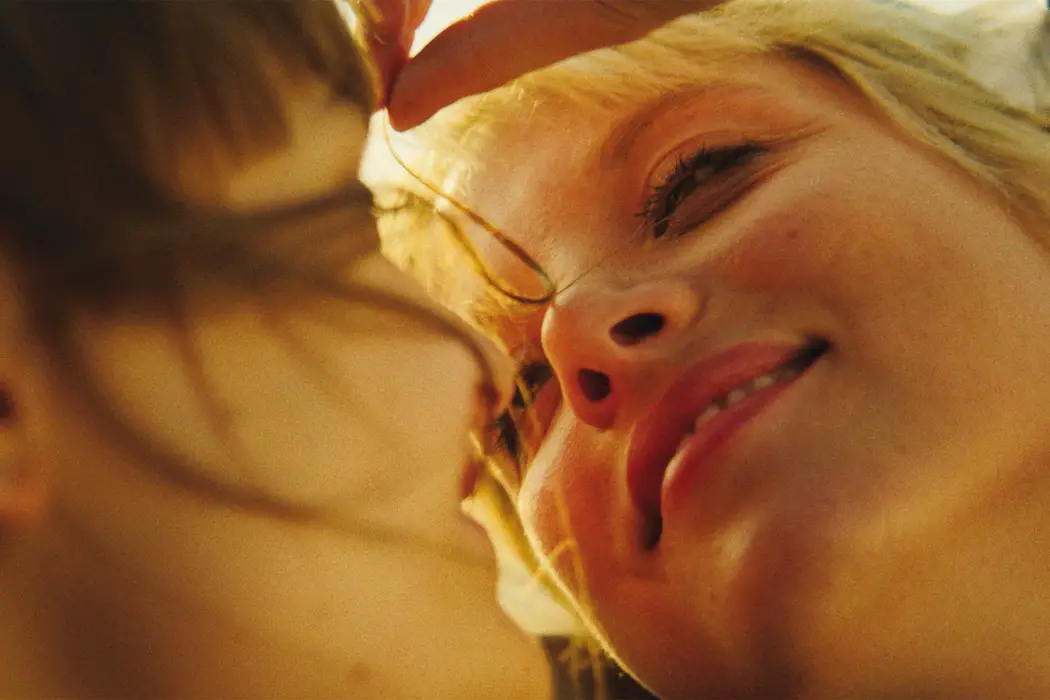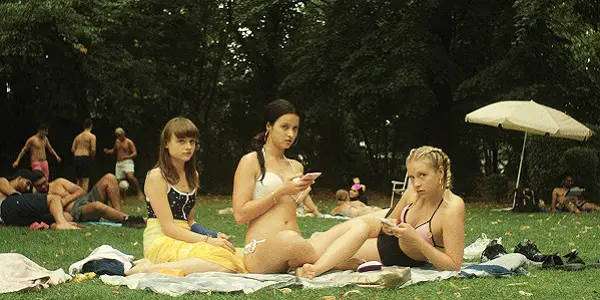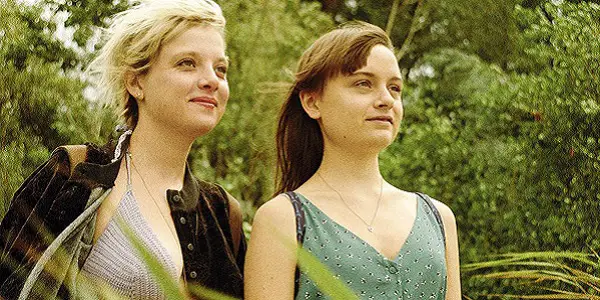COCOON: Becoming A Butterfly

Lee Jutton has directed short films starring a killer toaster,…
One of the hardest things about being a teenage girl is feeling you have to represent a certain ideal of femininity as you grow into womanhood. That ideal is presented to you as what is most desirable for boys, and thus what every girl should aspire to be: pretty, and willing to bear discomfort in order to be so; sexy, but not so slutty that boys won’t be willing to commit; girly, but still cool enough for boys to want to hang out with you. When you’re young and these images are seemingly everywhere you look—the female leads starring in romantic comedies, the models staring at you out of magazine pages, the pop stars strutting across the stage with long hair and flat stomachs—it takes a while to realize that it doesn’t necessarily have to be that way.
Writer-director Leonie Krippendorf’s beautiful coming-of-age film, Cocoon, is about one girl who suddenly realizes that there are other ways to be a woman—including being attracted to other women. As our heroine discovers her sexuality and herself in the heat of one particularly hot Berlin summer, she metamorphoses from shy teenage girl to confident young woman, much like the caterpillars she keeps in her room and watches transform into butterflies.
Hot Girl Summer
Nora (Lena Urzendowsky) is a 14-year-old girl growing up in Berlin’s vibrant, multicultural Kreuzberg neighborhood with her older sister, Jule (Lena Klenke), and a mother who spends more time hanging out in the local bar with her friends than she does raising her two daughters. Nora spends most of her days quietly tagging along with Jule and her best friend, Aylin (Elina Vildanova), as they flirt with boys, obsess over their diets, and post videos on social media of themselves pulling childish pranks. Nora cannot understand why Jule even wants a boyfriend when she has Aylin; after all, they tell each other they love each other and hold hands, what more could she want? Jule tells Nora it’s not the same thing, but for Nora, who finds herself increasingly attracted to other girls, it pretty much is.

Everything changes when Nora meets Romy (Jella Haase), an older girl who is essentially the opposite of Jule and Aylin in every possible way. With her shock of platinum blonde hair, baggy wardrobe, and crew of countercultural friends, Romy is someone who lives life according to how she wants—not according to how others, including the opposite sex, think she should. Nora is drawn to her like a moth to a flame, but what for Nora is the all-consuming passion of first love is not nearly as serious for Romy. Nonetheless, their relationship is one that, through all of its ups and downs, helps Nora emerge from her mother and sister’s shadows and figure out what kind of woman she really wants to be.
Love and Life
Cocoon depicts all of the magic and heartbreak inherent in discovering who you are and who you want to love. And of course, it takes place during summer—a time of freedom as well as transition, as you hover between years of schooling with seemingly all the time in the world to decide who you want to be to your peers when fall rolls around again. Even the smallest neighborhood can seem like a wide world full of possibilities when seen in the bright sunlight of summer; such is Nora’s Kreuzberg, the lively working-class melting pot of West Berlin, always full of people and places to explore and discover. It’s been almost three years since I was last in Germany, and nothing has made me miss the beautiful, bizarre city of Berlin as much as watching Cocoon.
The film’s cinematography, courtesy of Martin Neumayer, is saturated with the golden glow of the summer sun, giving it an almost vintage feel despite it taking place in 2018. This is further emphasized by Maya Postepski’s synth-heavy score, the retro vibes of which highlight the timelessness of Nora’s story (not to mention synthesizers, which always sound cool).

Urzendowsky is a revelation as Nora, who over the course of the film gets her first period, tries marijuana, breaks her hand, falls in love, has her heart broken, and just generally grows up. Nora never really questions that she’s queer; when she confides in a teacher that she finds girls more beautiful than boys, only for the teacher to tell her it might be a phase, you can see on her face that she knows it really isn’t. This is how she feels, and she’s going to explore it no matter what others think. As Nora gets to know Romy and her friends, going skinny-dipping and coloring her hair and attending Pride celebrations, we see her blossom before our very eyes. It’s a wonderful performance that should inspire a generation of young girls — whether queer or otherwise — trying to figure themselves out.
As the object of Nora’s affections, Haase brings the same earthy charm to the role of Romy that she did to the tragic Mieze in Burhan Qurbani’s modern reimagining of Berlin Alexanderplatz. It’s easy to understand why Nora would be drawn to her, both out of a desire to be with her and be like her. Romy lacks the artificiality of Jule and Aylin, both so focused on presenting a certain idea of perfection that they’ve picked up from social media and other sources; she’s imperfect — at least in the eyes of many others—but she embraces it, and teaches Nora to do the same.
Conclusion
The coming-of-age tale presented by Cocoon is not an idealized one that bears no resemblance to real life, but one that feels authentic in its pain and exhilaration. One is left feeling suffused with nostalgia for one’s own youth and the days that helped define who we are today.
What do you think? What are some of your favorite coming-of-age movies? Share your thoughts in the comments below.
Cocoon opens via virtual cinema, VOD and digital on June 17, 2022.
Watch Cocoon
Does content like this matter to you?
Become a Member and support film journalism. Unlock access to all of Film Inquiry`s great articles. Join a community of like-minded readers who are passionate about cinema - get access to our private members Network, give back to independent filmmakers, and more.
Lee Jutton has directed short films starring a killer toaster, a killer Christmas tree, and a not-killer leopard. Her writing has appeared in publications such as Film School Rejects, Bitch: A Feminist Response to Pop Culture, Bitch Flicks, TV Fanatic, and Just Press Play. When not watching, making, or writing about films, she can usually be found on Twitter obsessing over soccer, BTS, and her cat.













